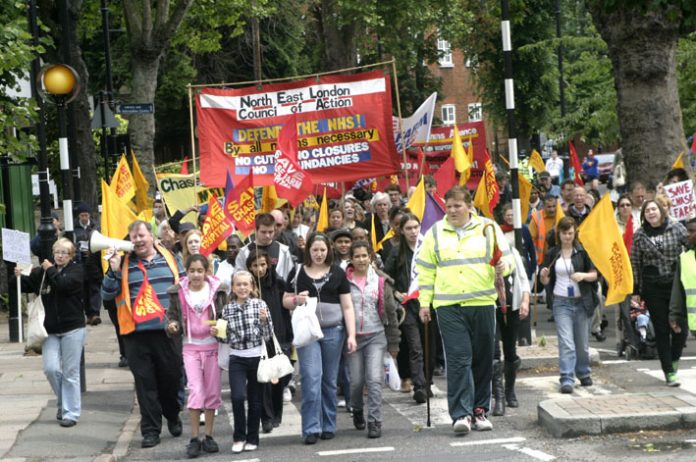thousands of workers, trade unionists, students and youth are marching through London this afternoon, against 13 years of Labour attacks on public services and against Tory plans to finish the job and smash up the Welfare State completely.
The ‘Protect our Welfare State and Public Services’ march and rally is supported by more than 30 organisations.
The march assembles at Temple Place, Embankment, at 12 noon, moving off at 1pm and arriving at Trafalgar Square for a rally at 2.
On the eve of the march, Unison General Secretary Dave Prentis called for support for public services, public sector workers, their families, their friends, their neighbours ‘and everyone else in society who depends on these vital services’.
Prentis stated: ‘A better future means an end to privatisation and new investment in services that are publicly owned, publicly provided, and publicly accountable.’
PCS General Secretary Mark Serwotka, told News Line yesterday: ‘The public services we all rely on are under severe threat from a political consensus that says massive cuts will be necessary after the election.
‘We are saying there is an alternative. Working families, unemployed workers, disabled people and pensioners should not be made to pay for the mistakes of the financial sector.’
Jerry Nelson who is organising the GMB mobilisation for today’s demonstration, said: ‘Since its beginning, Labour has supported the welfare state.
‘A decent society is one that recognises and invests in pensions, health care and education.
‘But this is clearly now under threat; if the Tories win we will see a concerted attack on the services, services that protect the most vulnerable in society.’
However, Labour’s Health Secretary Andy Burnham told a meeting of the King’s Fund think tank on Thursday night, that he will be supporting more hospital closures after the election, ignoring all opposition. (See page 3)
Hitting out at Tory plans for 40,000 public sector job cuts, Prentis said: ‘It is becoming clear that David Cameron’s so-called “efficiency savings” mean misery for hundreds of thousands of people who rely on public services and for the people who deliver them.’
Prentis was responding to Tory ‘efficiency adviser’, Sir Peter Gershon, who announced plans for public spending cuts of £12 billion, including £2 billion cuts in public sector pay, to fund a pledge to curb the rise in National Insurance.
Asked if the £2 billion pay cut would mean 40,000 job cuts, Cameron claimed ‘not job cuts but a hiring freeze’.
Unison also warned that the real winners behind Tory plans to cut NHS funding will be their friends in big business.
Prentis said: ‘Cameron is relying on the “efficiency savings” identified by Sir Peter Gershon, but these have more than a whiff of self interest.
‘It seems that General Healthcare Group, chaired by Gershon, are already counting the money that they will make through lucrative contracts, if the Tories get their hands on the NHS.
‘The NHS is not for sale and we cannot afford to waste precious public money bumping up the balance sheets of big business.’
GMB National Secretary Brian Strutton added: ‘The Tories much-hyped adviser Peter Gershon did exactly the same job for the government in 2004.
‘The Gershon Review at that time identified £20 billion worth of savings along the same lines he is saying now. Gershon’s recommendations in 2004 were implemented and savings found wherever possible.
‘It’s a nonsense to peddle the same ideas from 2004 as if they will generate new savings because they won’t. Gershon is old news and adds nothing fresh to the debate.
‘What’s really going on here is an attempt by the Tories to try to put a veneer of respectability on their true plan which is to decimate public services just like they did before. It’s not efficiencies, it’s slash and burn.’
The GMB also said that the Tory proposal to set a limit on public sector bosses pay of twenty times the lowest earner would lead to even higher pay for bosses.
Strutton said: ‘Twenty times the lowest pay in local government would be about £240,000, which would cap perhaps two or three chief executives while setting a new benchmark for all the others.
‘It would send a clear signal to all those council chief executives who earn 10-15 times the lowest paid that it’s perfectly acceptable for their pay to be hiked up.’
